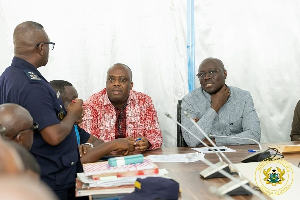ACCRA (AFP) - The trend for young doctors and nurses to seek higher salaries and better working conditions mainly in the West is killing the healthcare sector in Ghana, a senior public servant said Wednesday.
"It is the single most significant impact on healthcare delivery in this country," Ghana Health Service head Agyeman Badu Akosah told AFP in an interview.
Ghana currently has some 2,000 doctors -- one for every 11,000 inhabitants. That compares with one doctor per 2,000 people in the United States.
Many of the country's trained doctors and nurses leave to work in countries such as Britain, the United States, Jamaica and Canada, in what many refer to as the brain drain.
"We have hospitals ... that do not have a single doctor, that are run by enrolled nurses, who were originally trained to assist professional nurses in the delivery of care", Akosah said.
"There are more Ghanaian nurses in London than in Accra," said a diplomat in the region who requested anonymity.
According to Ghana's official statistics institute, in the period 1999 to 2004, 448 doctors, or 54 per cent of those trained in the period, left to work abroad.
The phenomenon, whilst not exclusive to Ghana, has taken on such proportions that President John Kufuor in his March 6 speech for the 50th anniversary of independence urged the nation's youth "to resolve to stay at home using your energies and your enthusiasm to serve Africa".
Kojo Mbeah, a final year law student in Kumasi, Ghana's second city, accused the government of hypocrisy.
"I am sick and tired of politicians .. telling us each time to stay. They have their children schooling abroad and working outside this country. We... are moving out", he said.
Another student, Michael Asante, said that even with his degree he would be better off doing menial jobs in the West.
"If I sweep in Ghana, how much am I going to be paid?" he asked. "But if I sweep the streets of New York, of London, definitely, I will earn something to take care of myself and family."
Some students, however, did say they would only travel abroad to further their education.
"I may go outside for some extra studies but .. even when I go, I will come back very young to serve my country," Edward Omane Boamah, who recently finished medical school, told AFP.
But Health Services boss Akosah insisted the government needs to take measures to get young doctors and nurses to stay or to return home.
"I am not saying that people should not go and acquire knowledge and skill", he said, but "the system should be such that they .. come back," he said.
Akosah said students who get government support for tertiary education should have to commit to serving their country for a certain period.
He called Ghana the only country that "would invest and not expect returns".
General News of Sunday, 18 March 2007
Source: AFP












